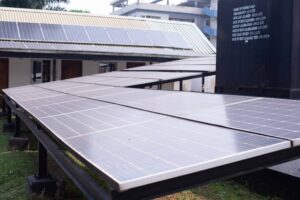Generators Vs. Solar Inverter Systems: Which Are Better in Nigeria?
Solar System or Generator?
How Does a Solar System Differ from a Generator?
Solar Inverter Systems
Traditional Generators
Comparison
Battery Capacity
Efficiency and Reliability
Long-Term Cost Benefits
Is a Solar System Worth It?
As most Nigerians grapple with energy challenges, the choice between generators and solar inverter systems has become a pivotal decision for individuals and businesses seeking reliable power solutions. This article aims to provide a comprehensive analysis, guiding readers through the factors that differentiate these systems and helping them make informed choices based on their specific needs and circumstances.
How Does a Solar System Differ from a Generator?
Solar Inverter Systems:
Solar inverter systems taps energy from the sun, converting it into electricity through photovoltaic panels. This sustainable approach reduces reliance on traditional power sources.
Traditional Generators:
Generators, fueled by petrol, diesel, or gas, provide a quick and accessible power source. However, their reliance on finite fuel resources raises concerns about long-term sustainability.
Comparison
Usage:
Solar systems are well-suited for consistent, low-power applications, making them ideal for residential and commercial use. Generators, known for high-power output, are often preferred as backup solutions during prolonged outages.
Battery Capacity:
Solar systems utilize batteries to store excess energy for use during periods of low sunlight, ensuring a continuous power supply. Generators rely on fuel tanks, limiting their runtime and requiring regular refueling.
Initial Investment:
While the upfront cost of solar systems is higher, their long-term cost benefits often outweigh the initial expenditure. Generators may have lower initial costs but can incur higher operational expenses over time.
Recharging:
Solar systems recharge for free using sunlight, providing a sustainable and cost-effective energy source. Generators depend on fuel, subject to market prices and availability.
Maintenance:
Solar systems generally have lower maintenance requirements due to fewer moving parts, reducing the need for regular servicing. Generators require routine maintenance, including oil changes and fuel filter replacements, contributing to higher operational costs.
Usage
Residential Applications:
Solar systems are ideal for powering homes with a consistent, low-energy demand, offering a reliable and sustainable solution. Generators are suitable for residences with higher power requirements or inconsistent grid access.
Commercial and Industrial Use:
Businesses with high power demands often opt for generators, while those aiming for sustainability and long-term savings may choose solar systems for their commercial and industrial operations.
Remote Areas and Accessibility:
In remote areas with ample sunlight, solar systems provide a reliable and sustainable energy source. Generators are practical in areas with limited sunlight or inconsistent fuel availability.
Initial Investment
Cost Analysis of Solar Systems:
While the initial investment for solar systems includes the cost of panels, inverters, and batteries, the long-term savings in energy bills often make them a financially sound choice.
Generator Purchase and Installation Costs:
Generators typically have lower upfront costs, but ongoing expenses for fuel and maintenance can accumulate, making the overall cost of ownership higher over time.
Recharging
Solar Power: Free and Sustainable:
Solar systems recharge for free using sunlight, providing a sustainable and cost-effective energy source that is not dependent on external fuel sources.
Generator Fuel Dependency:
Generators require fuel, which is subject to market prices and availability. Fuel dependency can be a concern during fuel shortages or price fluctuations.
Maintenance
Routine Maintenance:
Solar systems generally have lower maintenance requirements due to fewer moving parts, reducing the need for regular servicing and minimizing operational costs.
Long-Term Durability:
Generators require routine maintenance, including oil changes and filter replacements, contributing to higher operational costs over time. Solar systems, with fewer mechanical components, tend to be more durable in the long run.
Generators vs. Solar Systems: The Winner
Efficiency and Reliability:
Solar systems offer consistent, low-maintenance power, especially in areas with abundant sunlight. Generators provide quick, high-power solutions but may require more maintenance and fuel management.
Best Overall: Solar Systems
Advantages of Solar Inverter Systems:
Solar systems are recognized for their environmental friendliness, long-term cost savings, and low maintenance requirements, making them the preferred choice for many.
Long-Term Cost Benefits:
While the initial investment for solar systems may be higher, their long-term cost benefits, including reduced energy bills and minimal maintenance expenses, make them a financially prudent choice.
Is a Solar System Worth It?
Despite the initial costs, the return on investment for solar systems, both financially and environmentally, often justifies the expense over time.
In the generators vs. solar inverter systems debate, the choice ultimately depends on individual preferences, energy needs, and long-term sustainability goals. While generators offer quick, high-power solutions, solar systems emerge.